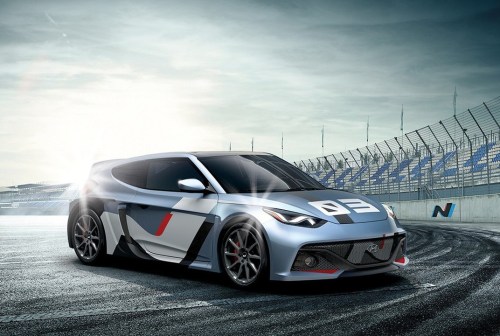
Once a tiny startup that specialized in electrifying 1980s BMWs, Croatia-based Rimac Automobili has attracted the attention and the money of several big names in the automotive industry. After teaming up with Porsche in 2018, the firm has received a significant investment from sister companies Hyundai and Kia that marks the beginning of a partnership forged to deliver zero-emissions performance.
Hyundai and Kia will jointly inject 80 million euros (about $90 million) into Rimac. In exchange, Rimac will help Hyundai’s performance-oriented N division make an electric version of the mid-engined prototype (pictured) we’ve seen testing numerous times over the past few years. At first, it looked like a hot-rodded variant of the Veloster with a turbocharged, four-cylinder engine installed in the space normally occupied by the rear seats. The announcement suggests it’s morphed into something completely different.
The yet-unnamed sports car will be positioned at the top of the Hyundai lineup as a halo model. Earlier in 2019, British magazine Autocar reported the model would arrive with all-wheel drive and a gasoline-electric hybrid powertrain. It’s unclear whether we’ll ultimately see both variants of the car, or if the engineers in charge of the project have chosen to navigate in a different direction. Similarly, technical details and the date of the car’s launch remain guarded. We’ve reached out to Hyundai for more details, and we’ll update this story if we hear back.
Interestingly, Hyundai and Rimac also announced plans to co-develop a high-performance car powered by a hydrogen fuel cell. Hyundai is a pioneer in the field of hydrogen technology, but it has only used its expertise to make humble, family-friendly crossovers like the Nexo. Again, details about the model were few and far between because it’s at the embryonic stage of development. When it arrives, it will most likely stand out as the only hydrogen-powered sports car on the market. Time will tell whether it starts a trend, and whether it’s sold as a Hyundai; we wouldn’t be surprised to see it join the burgeoning Genesis lineup.
Both projects will begin before the end of 2020. Rimac isn’t letting the growing number of partnerships distract it from its main mission. It remains committed to turning the 1,900-horsepower C_Two displayed during the 2018 Geneva Auto Show into a production model. Already sold out in spite of a $2 million price tag, the electric hypercar will post jaw-dropping performance figures that will send shivers down Bugatti’s spine when it reaches production in 2020.
“Our role as a technology supplier to the industry complements our role as a hypercar manufacturer, and the other way around,” a Rimac spokesperson told Digital Trends.
Editors' Recommendations
- Hyundai Ioniq 6 first drive review: welcome to the future
- Hyundai Ioniq 5 first drive review: Retro modern
- Apple reportedly aiming to build electric car for 2024 launch
- Hyundai launching all-electric brand, with three models on the way
- Waymo and Volvo ink deal to build an all-new electric robo-taxi